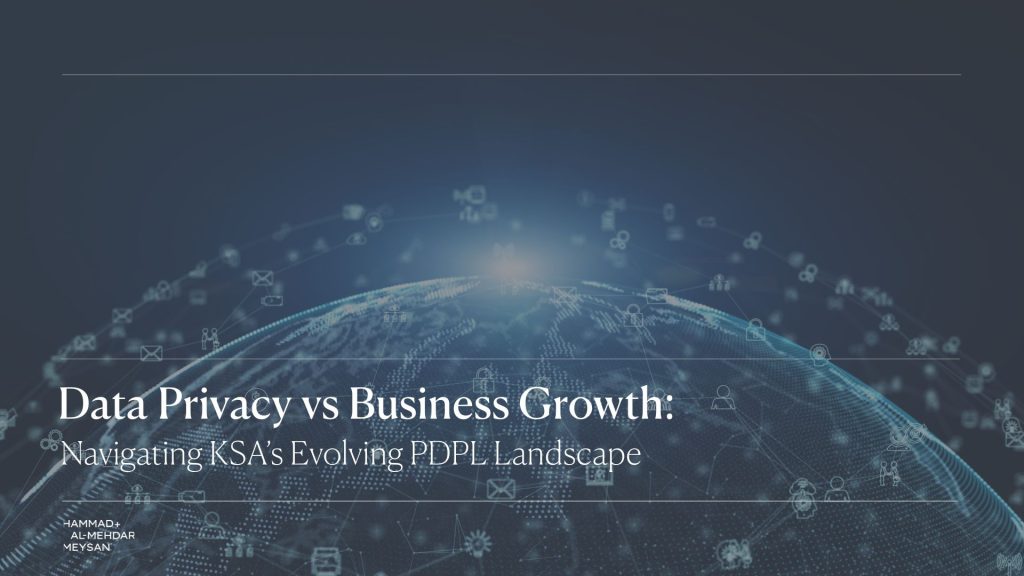
As Saudi Arabia continues to accelerate its digital transformation under Vision 2030, the balance between data privacy and commercial innovation has become a defining business challenge. The Personal Data Protection Law (PDPL) now plays a central role in shaping how organisations operate in the Kingdom, bringing both regulatory rigour and commercial opportunity.
Since its introduction, the PDPL has evolved into a sophisticated framework that aligns with global standards, while being tailored to the Kingdom’s socio-economic context. For companies operating in or interacting with the Saudi market, understanding the PDPL is no longer optional. Compliance is now a strategic imperative.
A Brief Overview of the PDPL Framework
The PDPL was first issued under Royal Decree No. M/19 on 16 September 2021 and is overseen by the Saudi Data and Artificial Intelligence Authority (SDAIA), in collaboration with the National Data Management Office (NDMO). The law aims to establish a transparent, accountable and secure system for the collection and processing of personal data.
Since its inception, the PDPL has undergone significant amendments, with the latest set of executive regulations issued in 2024. These updates introduced a more flexible and risk-based approach, particularly in areas such as international data transfers, consent mechanisms, and the role of data protection officers.
Core Compliance Requirements
Organisations subject to the PDPL must meet several key obligations:
- Lawful Processing: All personal data must be processed on a lawful basis. Consent remains the default, but exceptions include legal obligations, the protection of vital interests, or legitimate interests that do not conflict with the rights of individuals.
- Purpose, Limitation, and Data Minimisation: Data must only be collected for clear, lawful purposes and limited to what is necessary to achieve those purposes.
- Transparency and Rights of Data Subjects: Individuals have the right to be informed about how their data is processed. They can also request access to their data, corrections, deletion in some cases, and object to specific uses.
- Security and Risk Mitigation: Organisations are required to implement appropriate technical and organisational measures to protect data against unauthorised access, misuse, or loss.
- Data Breach Notification: Entities must notify SDAIA without undue delay in the event of a data breach. If the breach poses a high risk to individuals, those affected must also be informed.
- Registration and Governance Roles: Certain entities may need to register with SDAIA and appoint a data protection officer, particularly where large-scale or sensitive data processing is involved.
Cross-Border Data Transfers: A Pragmatic Shift
One of the most notable developments in the updated PDPL is the shift in approach to international data transfers. Initially, the law imposed strict limitations on sending personal data outside Saudi Arabia. However, the revised regime allows transfers subject to specific conditions, including:
- Adequacy of protection in the receiving jurisdiction
- Contractual safeguards such as standard clauses
- Regulatory approval, where applicable
- Justified business needs or legal obligations
This change is particularly welcome for multinationals and digital service providers, as it brings Saudi Arabia’s framework closer to established models like the EU’s GDPR, without losing sight of national interests.
Key Challenges for Businesses
While the PDPL aims to support innovation, it introduces several operational and legal complexities:
- Rising Compliance Costs: Achieving and maintaining compliance requires investment in legal advisory, IT systems, internal training, and policy development. This is especially challenging for SMEs with limited resources.
- Slower Product and Service Rollouts: New products must be designed with privacy in mind from the start. This “privacy by design” principle can add time and cost to development pipelines, particularly for data-reliant services like AI, analytics, or targeted advertising.
- Complex Third-Party Ecosystems: Businesses are responsible for the data practices of their service providers and partners. Due diligence, contractual oversight, and regular audits are now essential.
- Evolving Legal Landscape: Executive regulations and technical guidance continue to develop. Staying compliant means staying up to date with SDAIA’s latest requirements and being ready to adapt internal practices quickly.
A Strategic Approach to Compliance and Growth
Rather than viewing compliance as a regulatory hurdle, forward-looking organisations are embedding privacy into their long-term business strategy. Recommended actions include:
- Build Privacy into Design: Whether developing digital products or structuring internal processes, integrating privacy from the outset reduces future risks and builds trust with users and partners.
- Appoint Internal Leadership: Even where not required, designating a data protection lead or team ensures internal accountability and strengthens governance.
- Embrace Privacy-Enhancing Technologies: Automation tools that support consent management, audit logging, and data access requests can streamline compliance while supporting scalability.
- Conduct Routine Data Audits: Regular reviews of data processing activities help identify gaps, assess risk exposure, and ensure data is only held for valid purposes.
- Maintain a Dialogue with Regulators: Engaging with SDAIA and the NDMO through consultations or industry roundtables can help clarify expectations, especially in novel use cases or high-risk sectors.
Privacy as a Competitive Advantage
Saudi Arabia’s PDPL is more than a regulatory milestone; it is a cornerstone of the Kingdom’s broader ambition to become a global digital leader. Organisations that treat data privacy not just as a legal requirement, but as a business enabler, will be best placed to thrive.
Compliance can unlock greater customer confidence, smoother cross-border operations, and increased investment readiness. In today’s digital economy, trust is currency, and privacy is its foundation.
By adopting a forward-thinking, principles-based approach to data governance, businesses can not only meet PDPL obligations but also drive innovation, protect their brand, and contribute to a resilient and future-ready Saudi economy.
